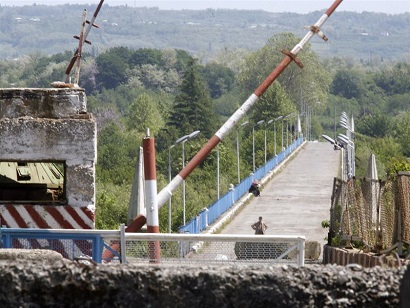Geneva Talks: Georgia raises issue of fortifying Georgia-Abkhaz border

Fortifying the so-called administrative border between Georgia and its breakaway region Abkhazia would be a "violation of human rights," say Georgian officials.
The Georgian side frowned upon the recent decision of the de-facto president of Abkhazia, where he said he planned to fortify its so-called administrative border with Georgia. Abkhazia’s de-facto leader Raul Khajimba said the region planned to restrict access between the two areas and reduce the number of checkpoints from six to one yesterday.
Georgia's Prime Minister Irakli Garibashvili believed such steps could not promote reconciliation between Georgians and Abkhazians.
"We want to actually start the process of reconciliation with our Abkhaz and Ossetian brothers. What happened during the last two decades is a tragedy for our nation," the PM said.
"We are eager to speed up the process of reconciliation and restore trust between Abkhazians and Georgians, Ossetians and Georgians. The Government is ready to provide humanitarian aid to them. It is no coincidence that a multi-functional hospital is being built in the vicinity of the demarcation line, where people living in Abkhazia will have access to free medical treatment. A multi-functional shopping center will be built in order to facilitate communication and restore confidence, trade, cultural and people-to-people relations. We react to their initiative with more love and warmth."
Deputy Foreign Minister of Georgia David Zalkaliani said Khajimba’s decision was a violation of people’s fundamental rights.
"Naturally, Khadjimba’s statement is further proof that the occupation forces and the de facto government are trying to create problems for the free movement of people, which is a serious violation of fundamental human rights,” Zalkalia said.
A Georgian delegation was scheduled to leave for Geneva on October 6, where the next round of international talks will take place. Zalkaliani said the Georgian side would "very strongly and seriously" raise this issue in Geneva.
"It is inadmissible and unacceptable. The international community, including the co-chairmen of the Geneva Talks, must take effective measures to ensure that fundamental human rights, such as the right to freedom of movement, are not restricted," the Georgian official said.
 Tweet
Tweet  Share
Share